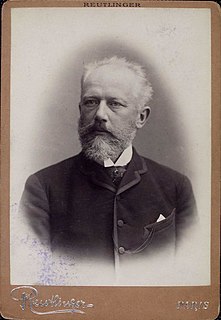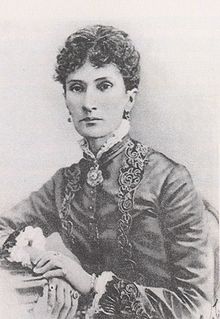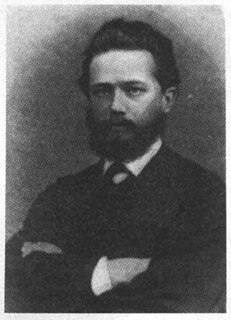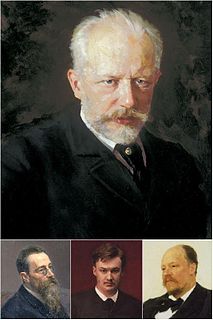Related Research Articles

Pyotr Ilyich Tchaikovsky was a Russian composer of the Romantic period. He was the first Russian composer whose music would make a lasting impression internationally. He wrote some of the most popular concert and theatrical music in the current classical repertoire, including the ballets Swan Lake and The Nutcracker, the 1812 Overture, his First Piano Concerto, Violin Concerto, the Romeo and Juliet Overture-Fantasy, several symphonies, and the opera Eugene Onegin.

César Antonovich Cui was a Russian composer and music critic, member of the Belyayev circle and The Five – a group of composers combined by the idea of creating a specifically Russian type of music. As an officer of the Imperial Russian Army he rose to the rank of Engineer-General, taught fortifications in Russian military academies and wrote a number of monographs on the subject.

The Music Lovers is a 1971 British drama film directed by Ken Russell and starring Richard Chamberlain and Glenda Jackson. The screenplay by Melvyn Bragg, based on Beloved Friend, a collection of personal correspondence edited by Catherine Drinker Bowen and Barbara von Meck, focuses on the life and career of 19th-century Russian composer Pyotr Ilyich Tchaikovsky. It was one of the director's biographical films about classical composers, which include Elgar (1962), Delius: Song of Summer (1968), Mahler (1974) and Lisztomania (1975), made from an often idiosyncratic standpoint.
Pyotr Ilyich Tchaikovsky's Trio in A minor, Op. 50, was written in Rome between December 1881 and late January 1882. It is subtitled À la mémoire d’un grand artiste [In memory of a great artist], in reference to Nikolai Rubinstein, his close friend and mentor, who had died on 23 March 1881. It is scored for piano, violin, and cello.

Nadezhda Filaretovna von Meck was a Russian businesswoman who became an influential patron of the arts, especially music. She is best known today for her artistic relationship with Pyotr Ilyich Tchaikovsky, supporting him financially for thirteen years, so that he could devote himself full-time to composition, while stipulating that they were never to meet. Tchaikovsky dedicated his Symphony No. 4 in F minor to her. She also gave financial support to several other musicians, including Nikolai Rubinstein and Claude Debussy.

Pyotr Ilyich Tchaikovsky's Symphony No. 4 in F minor, Op. 36, was written between 1877 and 1878. Its first performance was at a Russian Musical Society concert in Moscow on February 22, 1878, with Nikolai Rubinstein as conductor. In Middle Europe it sometimes receives the nickname "Fatum", or "Fate".
Pyotr Ilyich Tchaikovsky's String Quartet No. 1 in D major Op. 11 was the first of his three completed string quartets that were published during his lifetime. An earlier attempt had been abandoned after the first movement was completed.

Pyotr Ilyich Tchaikovsky wrote his Symphony No. 1 in G minor, Winter Daydreams , Op. 13, in 1866, just after he accepted a professorship at the Moscow Conservatory: it is the composer's earliest notable work. The composer's brother Modest claimed this work cost Tchaikovsky more labor and suffering than any of his other works. Even so, he remained fond of it, writing to his patroness Nadezhda von Meck in 1883 that "although it is in many ways very immature, yet fundamentally it has more substance and is better than any of my other more mature works." He dedicated the symphony to Nikolai Rubinstein.

Claude Debussy completed his String Quartet in G minor (L.91), in 1893 when he was 31 years old. It is Debussy's only string quartet.

In mid- to late-19th-century Russia, Pyotr Ilyich Tchaikovsky and a group of composers known as The Five had differing opinions as to whether Russian classical music should be composed following Western or native practices. Tchaikovsky wanted to write professional compositions of such quality that they would stand up to Western scrutiny and thus transcend national barriers, yet remain distinctively Russian in melody, rhythm and other compositional characteristics. The Five, made up of composers Mily Balakirev, Alexander Borodin, César Cui, Modest Mussorgsky, and Nikolai Rimsky-Korsakov, sought to produce a specifically Russian kind of art music, rather than one that imitated older European music or relied on European-style conservatory training. While Tchaikovsky himself used folk songs in some of his works, for the most part he tried to follow Western practices of composition, especially in terms of tonality and tonal progression. Also, unlike Tchaikovsky, none of The Five were academically trained in composition; in fact, their leader, Balakirev, considered academicism a threat to musical imagination. Along with critic Vladimir Stasov, who supported The Five, Balakirev attacked relentlessly both the Saint Petersburg Conservatory, from which Tchaikovsky had graduated, and its founder Anton Rubinstein, orally and in print.
The Liturgy of St. John Chrysostom is an a cappella choral composition by Pyotr Ilyich Tchaikovsky, his Op. 41, composed in 1878. It consists of settings of texts taken from the Divine Liturgy of St. John Chrysostom, the most celebrated of the eucharistic services of the Eastern Orthodox Church. Tchaikovsky's setting constitutes the first "unified musical cycle" of the liturgy.
Orchestral Suite No. 1 in D minor is an orchestral suite, Op. 43, written by Pyotr Ilyich Tchaikovsky in 1878 and 1879. It was premiered on December 20, 1879 at a Russian Musical Society concert in Moscow, conducted by Nikolai Rubinstein. The piece is dedicated to Tchaikovsky's patroness, Nadezhda von Meck.

Pyotr Ilyich Tchaikovsky's relations with the group of composers known as the Belyayev circle, which lasted from 1887 until Tchaikovsky's death in 1893, influenced all of their music and briefly helped shape the next generation of Russian composers. This group was named after timber merchant Mitrofan Belyayev, an amateur musician who became an influential music patron and publisher after he had taken an interest in Alexander Glazunov's work. By 1887, Tchaikovsky was firmly established as one of the leading composers in Russia. A favorite of Tsar Alexander III, he was widely regarded as a national treasure. He was in demand as a guest conductor in Russia and Western Europe, and in 1890 visited the United States in the same capacity. By contrast, the fortunes of the nationalistic group of composers known as The Five, which preceded the Belyayev circle, had waned, and the group had long since dispersed; of its members, only Nikolai Rimsky-Korsakov remained fully active as a composer. Now a professor of musical composition and orchestration at the Saint Petersburg Conservatory, Rimsky-Korsakov had become a firm believer in the Western-based compositional training that had been once frowned upon by the group.

Vladimir Davydov was the second son of Lev and Alexandra Davydov, and nephew of the composer Pyotr Ilyich Tchaikovsky, who called him "Bob".
The Grand Piano Sonata in G major, Op. 37, was written by Russian composer Pyotr Ilyich Tchaikovsky in 1878. Though initially received with critical acclaim, the sonata has struggled to maintain a solid position in the modern repertoire. Nevertheless, the sonata has been recorded numerous times and is recognized as one of the composer's masterworks. It is dedicated to Karl Klindworth.

Henryk Pachulski was a Polish-born pianist, composer and teacher who spent most of his life in Russia.
The String Quartet No. 2 in F major, Op. 22, by Pyotr Ilyich Tchaikovsky, was composed between December 1873 and January 1874. It premiered on 22 march 1874.

Iosif Iosifovich Kotek, also seen as Josef or Yosif, was a Russian violinist and composer remembered for his association with Pyotr Ilyich Tchaikovsky. He assisted Tchaikovsky with technical difficulties in the writing of the solo part in his Violin Concerto in D. He was also probably his lover at some point, although he was not exclusively homosexual, making him bisexual.

The Tchaikovsky House-Museum was the country home in Klin, 85 kilometers northwest of Moscow where Pyotr Ilyich Tchaikovsky lived from May 1892 until his death in 1893. His last major work, the 6th Symphony, was written there. The house is now a museum.
Władysław Pachulski was a Polish violinist, pianist and amateur composer who was the secretary to and later son-in-law of Nadezhda von Meck, the patroness for 13 years of Pyotr Ilyich Tchaikovsky. Pachulski was often the intermediary between composer and patroness, who had agreed never to meet face to face but to conduct an epistolary relationship. He played a significant role in the events surrounding the sudden break between them in 1890, and probably even instigated it.
References
- ↑ "Home". henryzajaczkowski.co.uk.
- ↑ "Bibliography (2015/17) - Tchaikovsky Research".
- ↑ "www.henryzajaczkowski.co.uk - The Oak in Winter [2013]".
- ↑ "My Musicological Publications – Henry Stephen Zajaczkowski" . Retrieved 28 January 2021.